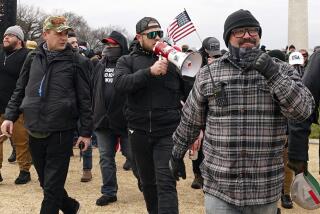The McVeigh Verdict Settles Nothing
- Share via
Was Timothy McVeigh on trial for his politics or for murder? Reading the transcripts of the trial and listening to media commentators, it was hard to tell. From the beginning, left-liberals in media and government used this tragedy for despicable political grandstanding.
Recall that in the early days after the bombing, the Clinton administration organized to blame it on the rise of talk radio. They darn near ascribed it to the Republican takeover of Congress. These are the people who have denounced McCarthyism for decades. This time, they implicated every right-of-center political activist as inherently dangerous.
In the trial itself, the prosecution continually announced and denounced McVeigh’s “motive” in the bombing. What was it? That he doesn’t like the federal government. For example, he carried documents with “virulent, violent, hateful rhetoric.” He quoted the Declaration of Independence. He was wearing a T-shirt spouting “hate” (actually the motto of the State of Virginia).
The next step is easy. Every person who is suspicious of government is a potential domestic terrorist. Better gag him and marginalize him while we can. The cause of restricting free speech, of chilling public debate, of censoring the Internet and of closing politics to outsiders has never had more friends on the left than it does today.
With the guilty verdict, then, liberals may think that they have won a great political victory. They’ll snuff out McVeigh and his antigovernment opinions. That will send a message: If you think that the federal government is too big and intrusive, you are capable of malicious acts. You too can be killed.
But the establishment is fooling itself if it thinks the trial will dispense with the political movement with which McVeigh is identified. Millions of people share his views. Moreover, their grievances are real and their concerns genuine. Nothing about this trial or its eventual outcome is going to change that.
The rise of militias and the patriot movement has not taken place in a vacuum. It coincides with a time when federal agencies have seized control of virtually every aspect of private and public life, and sent forth an army of federal bureaucrats and lawyers to enforce that control.
This trend has dramatically restricted individual liberty, something most Americans think they are entitled to as a matter of birth. We used to hear the phrase, “it’s a free country.” The phrase was used to turn back the burden of argument on those who would restrict our liberty, invade our privacy or take our property.
But no more. The burden of proof is now on the citizenry. In truth, we no longer live in a free country. The United States is host to the largest and most powerful government known to the history of man. And not a day goes by when some federal agency doesn’t demand more power.
The country is strewn with government’s victims. It’s the businessman who hired or promoted in the wrong racial configuration, the landowner whose property values have been destroyed by environmental bureaucrats, the family corporation driven to bankruptcy by regulations and taxes or the gun collector who finds himself unjustly under federal investigation.
Liberals say people who resent this are nut cases. Far nuttier is the belief that you can erect a leviathan state in what was once a free country and not have people resent it and rise up in rebellion against it.
All reports say that what’s been haunting McVeigh for years is the death of more than 80 people in Waco, Texas. A new film called “Waco: the Rules of Engagement” thoroughly debunks the claim that the Branch Davidians killed themselves. It was produced by a leftist sick of the moral blindness of his political compatriots. When it came time for justice, who was on trial? The surviving members of the church. They were jailed for 30 years and more.
The guilty verdict in the McVeigh trial will settle little. The judge forbade testimony of an informant for the federal Bureau of Alcohol, Tobacco and Firearms, Carol Howe, who wanted to implicate the federal government at some level. Further, the judge wouldn’t allow full reports of corruption at the FBI’s own lab.
The prosecution kept reminding us that the government was not on trial here. Will ever it be? Can it be, under our present system?
More to Read
Get the L.A. Times Politics newsletter
Deeply reported insights into legislation, politics and policy from Sacramento, Washington and beyond. In your inbox twice per week.
You may occasionally receive promotional content from the Los Angeles Times.










